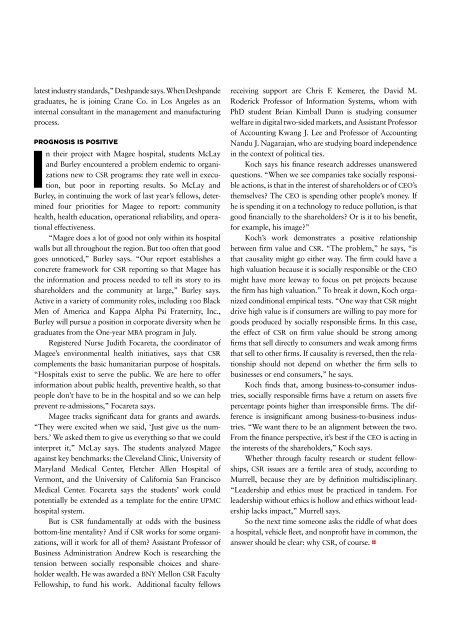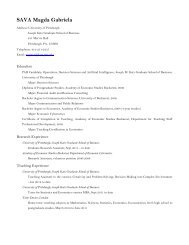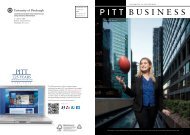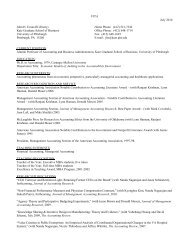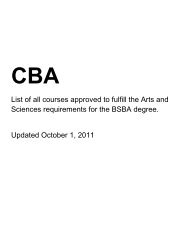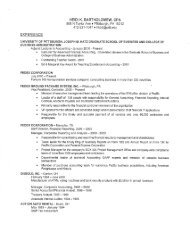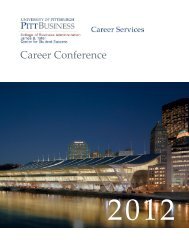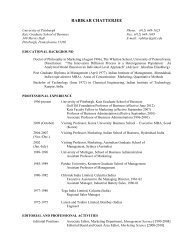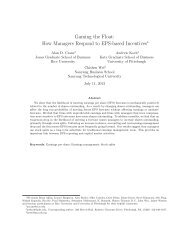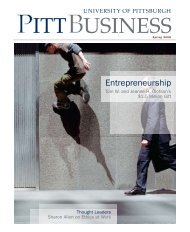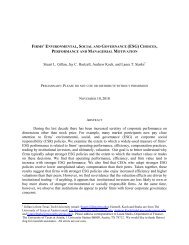Download PDF - Pitt Business - University of Pittsburgh
Download PDF - Pitt Business - University of Pittsburgh
Download PDF - Pitt Business - University of Pittsburgh
You also want an ePaper? Increase the reach of your titles
YUMPU automatically turns print PDFs into web optimized ePapers that Google loves.
latest industry standards,” Deshpande says. When Deshpande<br />
graduates, he is joining Crane Co. in Los Angeles as an<br />
internal consultant in the management and manufacturing<br />
process.<br />
Prognosis is Positive<br />
In their project with Magee hospital, students McLay<br />
and Burley encountered a problem endemic to organizations<br />
new to CSR programs: they rate well in execution,<br />
but poor in reporting results. So McLay and<br />
Burley, in continuing the work <strong>of</strong> last year’s fellows, determined<br />
four priorities for Magee to report: community<br />
health, health education, operational reliability, and operational<br />
effectiveness.<br />
“Magee does a lot <strong>of</strong> good not only within its hospital<br />
walls but all throughout the region. But too <strong>of</strong>ten that good<br />
goes unnoticed,” Burley says. “Our report establishes a<br />
concrete framework for CSR reporting so that Magee has<br />
the information and process needed to tell its story to its<br />
shareholders and the community at large,” Burley says.<br />
Active in a variety <strong>of</strong> community roles, including 100 Black<br />
Men <strong>of</strong> America and Kappa Alpha Psi Fraternity, Inc.,<br />
Burley will pursue a position in corporate diversity when he<br />
graduates from the One-year MBA program in July.<br />
Registered Nurse Judith Focareta, the coordinator <strong>of</strong><br />
Magee’s environmental health initiatives, says that CSR<br />
complements the basic humanitarian purpose <strong>of</strong> hospitals.<br />
“Hospitals exist to serve the public. We are here to <strong>of</strong>fer<br />
information about public health, preventive health, so that<br />
people don’t have to be in the hospital and so we can help<br />
prevent re-admissions,” Focareta says.<br />
Magee tracks significant data for grants and awards.<br />
“They were excited when we said, ‘Just give us the numbers.’<br />
We asked them to give us everything so that we could<br />
interpret it,” McLay says. The students analyzed Magee<br />
against key benchmarks: the Cleveland Clinic, <strong>University</strong> <strong>of</strong><br />
Maryland Medical Center, Fletcher Allen Hospital <strong>of</strong><br />
Vermont, and the <strong>University</strong> <strong>of</strong> California San Francisco<br />
Medical Center. Focareta says the students’ work could<br />
potentially be extended as a template for the entire UPMC<br />
hospital system.<br />
But is CSR fundamentally at odds with the business<br />
bottom-line mentality And if CSR works for some organizations,<br />
will it work for all <strong>of</strong> them Assistant Pr<strong>of</strong>essor <strong>of</strong><br />
<strong>Business</strong> Administration Andrew Koch is researching the<br />
tension between socially responsible choices and shareholder<br />
wealth. He was awarded a BNY Mellon CSR Faculty<br />
Fellowship, to fund his work. Additional faculty fellows<br />
receiving support are Chris F. Kemerer, the David M.<br />
Roderick Pr<strong>of</strong>essor <strong>of</strong> Information Systems, whom with<br />
PhD student Brian Kimball Dunn is studying consumer<br />
welfare in digital two-sided markets, and Assistant Pr<strong>of</strong>essor<br />
<strong>of</strong> Accounting Kwang J. Lee and Pr<strong>of</strong>essor <strong>of</strong> Accounting<br />
Nandu J. Nagarajan, who are studying board independence<br />
in the context <strong>of</strong> political ties.<br />
Koch says his finance research addresses unanswered<br />
questions. “When we see companies take socially responsible<br />
actions, is that in the interest <strong>of</strong> shareholders or <strong>of</strong> CEO’s<br />
themselves The CEO is spending other people’s money. If<br />
he is spending it on a technology to reduce pollution, is that<br />
good financially to the shareholders Or is it to his benefit,<br />
for example, his image”<br />
Koch’s work demonstrates a positive relationship<br />
between firm value and CSR. “The problem,” he says, “is<br />
that causality might go either way. The firm could have a<br />
high valuation because it is socially responsible or the CEO<br />
might have more leeway to focus on pet projects because<br />
the firm has high valuation.” To break it down, Koch organized<br />
conditional empirical tests. “One way that CSR might<br />
drive high value is if consumers are willing to pay more for<br />
goods produced by socially responsible firms. In this case,<br />
the effect <strong>of</strong> CSR on firm value should be strong among<br />
firms that sell directly to consumers and weak among firms<br />
that sell to other firms. If causality is reversed, then the relationship<br />
should not depend on whether the firm sells to<br />
businesses or end consumers,” he says.<br />
Koch finds that, among business-to-consumer industries,<br />
socially responsible firms have a return on assets five<br />
percentage points higher than irresponsible firms. The difference<br />
is insignificant among business-to-business industries.<br />
“We want there to be an alignment between the two.<br />
From the finance perspective, it’s best if the CEO is acting in<br />
the interests <strong>of</strong> the shareholders,” Koch says.<br />
Whether through faculty research or student fellowships,<br />
CSR issues are a fertile area <strong>of</strong> study, according to<br />
Murrell, because they are by definition multidisciplinary.<br />
“Leadership and ethics must be practiced in tandem. For<br />
leadership without ethics is hollow and ethics without leadership<br />
lacks impact,” Murrell says.<br />
So the next time someone asks the riddle <strong>of</strong> what does<br />
a hospital, vehicle fleet, and nonpr<strong>of</strong>it have in common, the<br />
answer should be clear: why CSR, <strong>of</strong> course.


